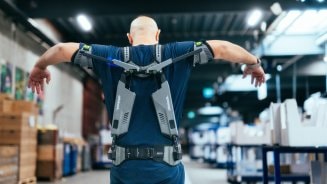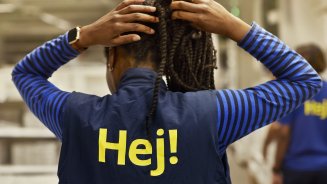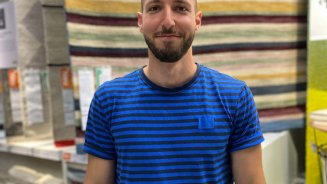On 10 October, between 15:45-16.10 CEST, Ingka Group is hosting a LinkedIn Live event as part of the company’s ONE HOME, ONE PLANET Dialogues, bringing together business leaders to discuss the unique ways businesses can support refugee integration.
Over the last decade, the number of refugees has more than doubled to reach nearly 30 million of the more than 100 million displaced people around the world. Persecution and/or conflict is forcing millions to flee their homes in countries like Ukraine, Syria, Venezuela, Mozambique, South Sudan, Afghanistan, Ethiopia, Myanmar, DRC and more.
For a variety of reasons, including barriers in accessing the labour market, refugees and asylum seekers tend to have higher levels of unemployment and can be subject to prejudice and discrimination.
“We believe that businesses are one key part of the solution to creating lasting positive impact for refugees around the world,” says Jesper Brodin, CEO of Ingka Group.
During the live LinkedIn session, Brodin will be joined by Tara Nathan, Executive Vice President for Humanitarian & Development sector at Mastercard, and Hamdi Ulukaya, CEO of Chobani and Founder of the Tent Partnership for Refugees. The event will be moderated by Yalda Hakim, award winning journalist and philanthropist.
“Now more than ever, it’s critical that companies, society and governments work together to support people into jobs because it’s a key factor for integration and personal development,” Brodin says. “Our work is not just a humanitarian effort – it’s good for business.”
Together the participants will explore:
- How businesses can better nurture the talent and skills of refugees?
- What the barriers for business leaders are in accelerating initiatives to support refugee integration?
- How businesses can change the perception of refugees in our communities?
Tara Nathan says Mastercard is designing infrastructure for refugee communities that enables commercially sustainable and digital solutions when humanitarian aid runs out, providing refugees a path to prosperity. “Private sector businesses are structured to succeed at scale and for the long-term, so they should be leveraged to bridge the divide from humanitarian to development,” she says.
More about the IKEA approach to refugee integration
Since 2019, different IKEA related entities have been working systematically to create a better every day and improve the long-term prospects for as many refugees as possible. Ingka Group, Inter IKEA Group and IKEA Foundation have committed to different actions to help to advance the integration of refugees in society though various initiatives with partners.
Ingka Group’s Skills for Employment initiative has so far supported more than 1,700 refugees and asylum seekers in 24 markets to improve their employability, local language skills and provide work experience to gain access to work either at Ingka or other companies. Sixty-five percent got a job in or outside of IKEA.
The company has also published a “Skills for Employment Toolkit: A how-to guide for opening pathways to decent work for refugees”. It features a 7-step process, learnings and tips Ingka Group has gathered over the years. It’s meant to act as a catalyst that inspires and encourages companies to do the meaningful work of integrating refugees into the workforce.
Most recently, spurred by the war in Ukraine, Ingka Group is extending and reinforcing its commitment to inclusive growth with a new framework for hiring displaced talent where the company is working proactively to recruit forcibly displaced people.
Media enquiries
For further information, journalists and media professionals can contact us at [email protected] or by calling +46 70 993 6376.














